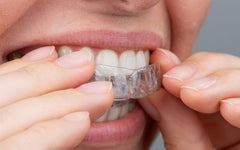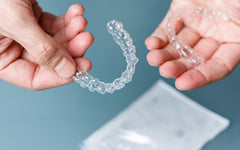
Can You Use Denture Cleaner on Retainers?
Retainers are an essential part of maintaining tooth alignment, especially after orthodontic treatment. Proper cleaning and maintenance are crucial for keeping retainers free from bacteria and plaque buildup. While denture cleaners are commonly used to clean dentures, many people wonder if they can be used on retainers as well. In this article, we will explore the risks and benefits of using denture cleaner on retainers, alternative cleaning methods, expert recommendations for retainer maintenance, and tips for extending the lifespan of retainers.
The difference between dentures & retainers
Retainers and dentures may seem similar, as both are removable dental appliances. However, there are important differences between them. Dentures are specifically designed to replace missing teeth, while retainers are primarily used to maintain the position of teeth after orthodontic treatment.
With over 40 million Americans thought to use dentures, it can be tempting to use denture cleaner on retainers if you have some in your bathroom cabinet. However, it’s not recommended as the materials used in retainers, such as clear plastic or metal wires, may not be compatible with the chemicals commonly found in some denture cleaners.
Issues with using denture cleaner on retainers
Using denture cleaner on retainers comes with risks and can cause damage. Although it may seem convenient to use denture cleaner on your retainer as it's readily available and designed to remove tough stains and kill bacteria, the risks of using denture cleaner on retainers outweigh the benefits.
Denture cleaners often contain abrasive ingredients that can scratch or weaken the surface of retainers. This can create places for bacteria to thrive, jeopardizing oral health. Additionally, denture cleaners may contain chemicals that can react negatively with the materials of retainers, causing discoloration or deterioration.

Alternative cleaning methods for retainers
If denture cleaner is not recommended for cleaning retainers, what are the alternative cleaning methods available? Here are some other safe methods to keep your retainers clean:
Using retainer cleaning tablets
Specifically designed for retainers, these sterilizing tablets provide a convenient and effective cleaning solution. Follow the instructions on the packaging, usually involving dissolving the tablet in lukewarm water and soaking the retainers for a specified period. These tablets are formulated to remove stains, kill bacteria, and freshen the retainers' scent.
Use an ultrasonic cleaning machine
An ultrasonic cleaning machine is a small machine that uses high-frequency ultrasonic waves to eliminate bacteria, grime and plaque from retainers and other oral appliances via a process called cavitation. Ultrasonic cleaning technology is completely safe and reliable to use and the Dental Pod by Zima Dental is specifically designed for retainers and recommended by leading dentists around the world.
When used in combination with the Dental Pod Sterilizing Tablets, retainers are left with a fresh mint taste and the confidence that 99.9% of bacteria have been killed.
Expert recommendations for retainer maintenance
To ensure the longevity and effectiveness of your retainers, it is important to follow expert recommendations for retainer maintenance:
Clean your retainers daily
Make it a habit to clean your retainers daily to prevent the buildup of bacteria and plaque. By incorporating a regular cleaning routine, you can maintain optimal oral hygiene and prolong the lifespan of your retainers. If you wear a dirty retainer you could develop bad breath, cavities, and even gum disease. The fact a study found that over 50% of retainers carry bacteria that usually aren’t found in your oral microbiome like candida and Staphylococcus shows the importance of daily cleaning. The Dental Pod can conveniently be used every day.
Avoid hot water
Exposing your retainers to hot water can cause warping or deformation. Stick to lukewarm water for cleaning and avoid using boiling water or hot beverages to prevent damage to the retainers.
Handle with care
Retainers are delicate appliances that can easily become damaged if mishandled. Always handle them with clean hands and use retainer-specific cleaners to prevent scratches and abrasions.

Tips for extending the lifespan of retainers
To maximize the lifespan of your retainers, consider the following tips:
Store in a retainer case
When not in use, always store your retainers in a clean retainer case to protect them from damage or loss. Avoid leaving them exposed on surfaces or wrapping them in tissues, as this can lead to contamination or accidental disposal.
The Zima Go is a high-quality UV oral appliance case that helps keep your retainer safe when not in use. With in-built UVA and UVC sterilization technology, the Zima Go eliminates bacteria and pathogens from the surface of your retainers.
Avoid exposure to heat or sunlight
Retainers are sensitive to temperature, so it is important to keep them away from direct sunlight and high temperatures. Prolonged exposure to heat can cause warping or deformation, compromising the fit and effectiveness of the retainers.
Regular dental check-ups:
Regular visits to your dentist or orthodontist are essential for ensuring the proper fit and function of your retainers. They can assess your retainer's condition and make any necessary adjustments or replacements to ensure optimal oral health.
Common mistakes to avoid when cleaning retainers
While keeping your retainers clean is important, there are common mistakes that should be avoided:
Using toothpaste
Toothpaste may contain abrasives that can damage the retainers. Stick to using retainer-specific cleaning solutions that have been recommended by qualified dentists for cleaning your retainer.
Using alcohol-based products
Alcohol can degrade the materials of the retainers, leading to discoloration or deterioration. Avoid using products containing alcohol for cleaning purposes.
Skipping cleaning altogether
Neglecting to clean your retainers regularly can result in an accumulation of bacteria and plaque, compromising oral health. Make sure to follow a consistent cleaning routine.

Should you use denture cleaner on retainers?
In conclusion, although a dedicated denture cleaner may seem like a convenient option, it is not recommended for cleaning retainers due to the potential risks and damage it can cause.
Instead, opt for a cleaner that is suitable for retainers and follow expert recommendations for retainer maintenance to ensure the longevity and effectiveness of your retainers. An ultrasonic cleaner, such as the Dental Pod, paired with sterilization tablets makes for an efficient and effective way of cleaning your retainers and is also safe to use on dentures and other oral appliances.
Clinical grade retainer cleaning at home
At Zima Dental, we provide innovative cleaning solutions for retainers and other oral appliances. Keep your retainers clean, fresh, and free from bacteria with our range of products.
To find out more or to ask a question, please get in touch with the Zima Dental Customer Care team by clicking here.






Leave a Comment